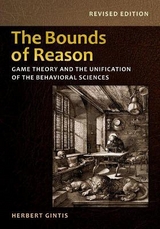
The Bounds of Reason
Princeton University Press (Verlag)
978-0-691-14052-0 (ISBN)
- Titel erscheint in neuer Auflage
- Artikel merken
Game theory is central to understanding human behavior and relevant to all of the behavioral sciences--from biology and economics, to anthropology and political science. However, as The Bounds of Reason demonstrates, game theory alone cannot fully explain human behavior and should instead complement other key concepts championed by the behavioral disciplines. Herbert Gintis shows that just as game theory without broader social theory is merely technical bravado, so social theory without game theory is a handicapped enterprise. Gintis illustrates, for instance, that game theory lacks explanations for when and how rational agents share beliefs. Rather than construct a social epistemology or reasoning process that reflects the real world, game theorists make unwarranted assumptions which imply that rational agents enjoy a commonality of beliefs. But, Gintis explains, humans possess unique forms of knowledge and understanding that move us beyond being merely rational creatures to being social creatures.
For a better understanding of human behavior, Gintis champions a unified approach and in doing so shows that the dividing lines between the behavioral disciplines make no scientific sense. He asks, for example, why four separate fields--economics, sociology, anthropology, and social psychology--study social behavior and organization, yet their basic assumptions are wildly at variance. The author argues that we currently have the analytical tools to render the behavioral disciplines mutually coherent. Combining the strengths of the classical, evolutionary, and behavioral fields, The Bounds of Reason reinvigorates the useful tools of game theory and offers innovative thinking for the behavioral sciences.
Herbert Gintis holds faculty positions at the Santa Fe Institute, Central European University, and University of Siena. He is the author of "Game Theory Evolving" (Princeton) and the coeditor of numerous books, including "Moral Sentiments and Material Interests, Unequal Chances" (Princeton), and "Foundations of Human Sociality".
Preface xiii Chapter 1: Decision Theory and Human Behavior 1 1.1 Beliefs, Preferences, and Constraints 4 1.2 The Meaning of Rational Action 6 1.3 Why Are Preferences Consistent? 7 1.4 Time Inconsistency 8 1.5 Bayesian Rationality and Subjective Priors 11 1.6 The Biological Basis for Expected Utility 16 1.7 The Allais and Ellsberg Paradoxes 16 1.8 Risk and the Shape of the Utility Function 18 1.9 Prospect Theory 21 1.10 Heuristics and Biases in Decision Making 26 Chapter 2: Game Theory: Basic Concepts 30 2.1 The Extensive Form 30 2.2 The Normal Form 33 2.3 Mixed Strategies 34 2.4 Nash Equilibrium 35 2.5 The Fundamental Theorem of Game Theory 36 2.6 Solving for Mixed-Strategy Nash Equilibria 37 2.7 Throwing Fingers 38 2.8 The Battle of the Sexes 38 2.9 The Hawk-Dove Game 39 2.10 The Prisoner's Dilemma 40 2.11 Alice, Bob, and the Choreographer 41 2.12 An Efficiency-Enhancing Choreographer 43 2.13 The Correlated Equilibrium Solution Concept 44 Chapter 3: Game Theory and Human Behavior 45 3.1 Self- and Other-Regarding Preferences 46 3.2 Methodological Issues in Behavioral Game Theory 49 3.3 An Anonymous Market Exchange 52 3.4 The Rationality of Altruistic Giving 54 3.5 Conditional Altruistic Cooperation 56 3.6 Altruistic Punishment 57 3.7 Strong Reciprocity in the Labor Market 59 3.8 Altruistic Third-Party Punishment 61 3.9 Altruism and Cooperation in Groups 64 3.10 Inequality Aversion 68 3.11 The Trust Game 71 3.12 Character Virtues 73 3.13 The Situational Character of Preferences 75 3.14 The Dark Side of Altruistic Cooperation 77 3.15 Norms of Cooperation: Cross-Cultural Variation 78 Chapter 4: Rationalizability and Common Knowledge of Rationality 83 4.1 Epistemic Games 83 4.2 A Simple Epistemic Game 86 4.3 An Epistemic Battle of the Sexes 87 4.4 Dominated and Iteratedly Dominated Strategies 88 4.5 Eliminating Weakly Dominated Strategies 89 4.6 Rationalizable Strategies 90 4.7 Eliminating Strongly Dominated Strategies 92 4.8 Common Knowledge of Rationality 93 4.9 Rationalizability and Common Knowledge of Rationality 94 4.10 The Beauty Contest 94 4.11 The Traveler's Dilemma 95 4.12 The Modified Traveler's Dilemma 96 4.13 Global Games 98 4.14 CKR Is an Event, Not a Premise 100 Chapter 5: Extensive Form Rationalizability 102 5.1 Backward Induction and Dominated Strategies 102 5.2 Subgame Perfection 104 5.3 Subgame Perfection and Incredible Threats 105 5.4 The Surprise Examination 105 5.5 The Common Knowledge of Logicality Paradox 106 5.6 The Repeated Prisoner's Dilemma 107 5.7 The Centipede Game 108 5.8 CKR Fails Off the Backward Induction Path 110 5.9 How to Play the Repeated Prisoner's Dilemma 112 5.10 The Modal Logic of Knowledge 114 5.11 Backward Induction and Extensive Form CKR 115 5.12 Rationality and Extensive Form CKR 118 5.13 On the Nonexistence of CKR 119 Chapter 6: The Mixing Problem: Purification and Conjectures 121 6.1 Why Play Mixed Strategies? 121 6.2 Harsanyi's Purification Theorem 123 6.3 A Reputational Model of Honesty and Corruption 125 6.4 Purifying Honesty and Corruption 128 6.5 Epistemic Games: Mixed Strategies as Conjectures 128 6.6 Resurrecting the Conjecture Approach to Purification 129 Chapter 7: Bayesian Rationality and Social Epistemology 132 7.1 The Sexes: From Battle to Ballet 133 7.2 The Choreographer Trumps Backward Induction 134 7.3 Property Rights and Correlated Equilibrium 135 7.4 Convention as Correlated Equilibrium 136 7.5 Correlated Strategies and Correlated Equilibria 136 7.6 Correlated Equilibrium and Bayesian Rationality 138 7.7 The Social Epistemology of Common Priors 139 7.8 The Social Epistemology of Common Knowledge 141 7.9 Social Norms 143 7.10 Game Theory and the Evolution of Norms 143 7.11 The Merchants' Wares 144 Chapter 8: Common Knowledge and Nash Equilibrium 146 8.1 Conditions for a Nash Equilibrium in Two-Player Games 146 8.2 A Three-Player Counterexample 147 8.3 The Modal Logic of Common Knowledge 149 8.4 The Commonality of Knowledge 152 8.5 The Tactful Ladies 153 8.6 The Tactful Ladies and the Commonality of Knowledge 156 8.7 Agreeing to Disagree 158 8.8 The Demise of Methodological Individualism 161 Chapter 9: Reflective Reason and Equilibrium Refinements 164 9.1 Perfect, Perfect Bayesian, and Sequential Equilibria 166 9.2 Incredible Threats 167 9.3 Unreasonable Perfect Bayesian Equilibria 170 9.4 The LBR criterion picks out the sequential equilibrium 171 9.5 Selten's Horse: Sequentiality vs. the LBR criterion 171 9.6 The Spence Signaling Model 173 9.7 Irrelevant Node Additions 174 9.8 Improper Sequential Equilibria 175 9.9 Second-Order Forward Induction 176 9.10 Beer and Quiche Without the Intuitive Criterion 177 9.11 An Unreasonable Perfect Equilibrium 178 9.12 The Principle of Insufficient Reason 179 9.13 The Principle of Honest Communication 179 9.14 Induction: Forward is Robust, Backward is Fragile 180 Chapter 10: The Analytics of Human Sociality 181 10.1 Explaining Cooperation: An Overview 181 10.2 Bob and Alice Redux 183 10.3 The Folk Theorem 185 10.4 The Folk Theorem with Imperfect Public Information 188 10.5 Cooperation with Private Signaling 193 10.6 One Cheer For the Folk Theorem 195 10.7 Altruistic Punishing in the Public Goods Game 197 10.8 The Failure of Models of Self-Regarding Cooperation 200 Chapter 11: The Evolution of Property Rights 201 11.1 The Endowment Effect 201 11.2 Territoriality 204 11.3 Property Rights in Young Children 207 11.4 Respect for Possession in Nonhuman Animals 207 11.5 Conditions for a Property Equilibrium 210 11.6 Property and Antiproperty Equilibria 213 11.7 An Antiproperty Equilibrium 217 11.8 Property Rights as Choreographer 220 Chapter 12: The Unification of the Behavioral Sciences 221 12.1 Gene-Culture Coevolution: The Biological Model 223 12.2 Culture and Physiology of Human Communication 228 12.3 Biological and Cultural Dynamics 229 12.4 The Theory of Norms: The Sociological Model 231 12.5 Socialization and the Internalization of Norms 233 12.6 Rational Choice: The Economic Model 234 12.7 Deliberative Choice: The Psychological Model 236 12.8 Application: Addictive Behavior 238 12.9 Game Theory: The Universal Lexicon of Life 239 12.10 Epistemic Game Theory and Social Norms 240 12.11 Society as a Complex Adaptive System 242 12.12 Counterpoint: Biology 244 12.13 Counterpoint: Economics 245 12.14 Counterpoint: Psychology 245 12.15 The Behavioral Disciplines Can Be Unified 247 Chapter 13: Summary 248 Chapter 14: Table of Symbols 250 References 253 Index 283
| Erscheint lt. Verlag | 5.4.2009 |
|---|---|
| Zusatzinfo | 36 line illus. |
| Verlagsort | New Jersey |
| Sprache | englisch |
| Maße | 178 x 254 mm |
| Gewicht | 794 g |
| Themenwelt | Geisteswissenschaften ► Philosophie |
| Geisteswissenschaften ► Psychologie ► Sozialpsychologie | |
| Mathematik / Informatik ► Mathematik ► Angewandte Mathematik | |
| Mathematik / Informatik ► Mathematik ► Finanz- / Wirtschaftsmathematik | |
| Sozialwissenschaften | |
| Wirtschaft ► Volkswirtschaftslehre | |
| ISBN-10 | 0-691-14052-9 / 0691140529 |
| ISBN-13 | 978-0-691-14052-0 / 9780691140520 |
| Zustand | Neuware |
| Haben Sie eine Frage zum Produkt? |
aus dem Bereich



